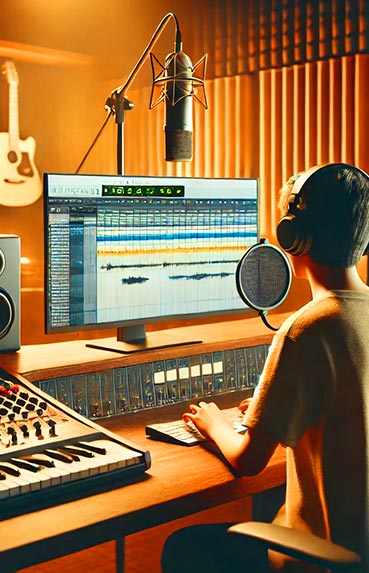Music has always been a fundamental element in the celebration of special events. From weddings to anniversaries, including corporate events and charity galas, music has the power to transform the atmosphere and evoke deep emotions. In this context, music personalization has become an essential tool for creating memorable and meaningful experiences. In this article, we will explore why personalization is so crucial in music for special events, how to implement it effectively, and the benefits it can bring to organizers and attendees.
Music Personalization: A Key Element in Creating Atmospheres
Music as a Reflection of the Event's Identity
Personalizing music allows an event to faithfully reflect the identity and values of its hosts or the organization hosting it. Carefully selecting songs and music genres can make the event unique and memorable. For example, a wedding that chooses music reflecting the couple's personal stories not only moves the attendees but also creates an intimate and personal atmosphere.
To achieve this personalization, it is important to consider several factors:
- The theme of the event: Music should complement the overall theme. For instance, an event with a vintage theme might benefit from a selection of jazz or swing music from the 1920s and 1930s.
- The audience: Knowing the musical tastes of the guests can help create a playlist that appeals to everyone. This is especially important in corporate events, where an inappropriate music selection could clash with the professional profile of the attendees.
- Time and place: Music should adapt to the time of day and the physical environment of the event. An outdoor ceremony during the day might benefit from soft, acoustic music, while a nighttime party in an enclosed hall might require more upbeat rhythms.
The Influence of Music on Attendees' Mood
Music has a direct impact on people's mood and emotions. Studies have shown that certain melodies can reduce stress, increase happiness, and improve social interaction. In special events, personalized music can be used to:
- Create anticipation and excitement: A carefully chosen music selection can set the right tone from the start, generating positive expectations among attendees.
- Facilitate emotional connection: Music that resonates with attendees can foster a sense of community and belonging, which is especially valuable in family or intimate events.
- Guide the flow of the event: Music can act as a cue for attendees, marking transitions between different parts of the event, such as the ceremony, banquet, and dance.
Strategies for Personalizing Music in Events
Collaboration with Music Professionals
To ensure that an event's music is truly personalized, it is advisable to collaborate with music professionals, such as DJs, live bands, or music consultants. These experts can offer valuable insight into how to select and mix music to create the desired atmosphere.
- DJs: They can create playlists tailored to the client's preferences and have the flexibility to adjust the music in real-time based on the audience's response.
- Live bands: They offer a unique and authentic experience that can be particularly effective in events where live music is a central component.
- Music consultants: They can work with organizers to understand the event's vision and provide personalized recommendations.
Using Technology for Music Personalization
Modern technology offers powerful tools for personalizing music at events. From streaming applications to playlist creation platforms, technology can facilitate the selection and organization of music.
- Streaming platforms: Services like Spotify or Apple Music allow for collaborative playlists where attendees can suggest songs, increasing participation and emotional connection with the event.
- Music mixing software: Tools like Serato or Virtual DJ allow DJs to create smooth and personalized transitions between songs, maintaining the flow and energy of the event.
- Surround sound technology: Advanced audio systems can create an immersive listening experience, adapting the music to the physical space and enhancing the overall perception of the event.
Incorporating technology into music planning not only improves sound quality but also offers opportunities to innovate and surprise attendees.
Benefits of Music Personalization in Events
Creating Memorable Experiences
Personalized music has the power to transform an ordinary event into an unforgettable experience. By resonating emotionally with attendees, music can leave a lasting impression that will forever be associated with the event in question.
A study by the University of London found that people are more likely to remember events where music was carefully selected to match their tastes and the general ambiance. This type of personalization not only enhances the attendee experience but can also increase the likelihood of them speaking positively about the event within their networks, which is especially beneficial for corporate and charitable events.
Reinforcing the Brand in Corporate Events
In the corporate realm, personalized music can be a powerful tool for reinforcing brand identity and enhancing the perception of the event. Music selection that reflects the company's values and culture can strengthen the emotional bond between the brand and its clients or employees.
- Product launch events: Using music that evokes the characteristics of the new product can increase excitement and anticipation among attendees.
- Conferences and seminars: A music selection consistent with the topics discussed can improve information retention and participant satisfaction.
- Company parties: Music that reflects the corporate culture can foster a sense of community and motivation among employees.
Practical Tips for Music Personalization
For those looking to personalize music at their events, here are some practical tips:
- Research attendees' musical preferences: Conducting surveys or interviews prior to the event can provide valuable insights into guests' musical tastes.
- Create a musical theme: Choosing a central theme or genre for the event's music can help guide song selection and create a cohesive experience.
- Test the music in advance: Organizing pre-event listening sessions can help identify potential issues and ensure the selected music meets expectations.
- Be flexible and adaptable: During the event, being prepared to adjust the music based on audience response can significantly enhance the attendee experience.
Conclusion
Personalizing music for special events is not just about song selection; it's an opportunity to create experiences that resonate emotionally with attendees and leave a lasting impression. Through collaboration with music professionals, the use of advanced technology, and careful consideration of guests' tastes and needs, event organizers can transform any celebration into a truly special moment. In the end, personalized music not only beautifies the event but also enriches the lives of all who participate.

















